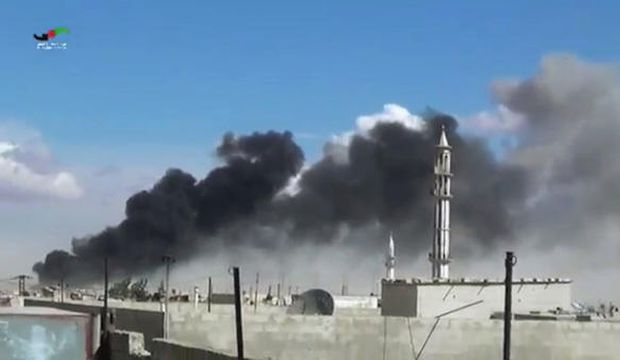
In this image made from video provided by the Homs Media Center, which has been verified and is consistent with other AP reporting, smoke rises after airstrikes by what were reported to be Russian military jets in Talbiseh of the Homs province, western Syria, on September 30, 2015. (Homs Media Centre via AP)
Baghdad, Asharq Al-Awsat—Several Kurdish and Iraqi officials have rejected a recently announced initiative by Iraq’s government to cooperate with Russia, Iran, and Syria in the fight against the Islamic state of Iraq and Syria (ISIS).
Baghdad announced on Sunday it would be sharing “security and intelligence” on ISIS through “comprehensive coordination” with the three countries. Russian President Vladimir Putin announced Moscow would be setting up an intelligence unit in the Iraqi capital.
However, several Iraqi officials, including from the autonomous Kurdistan Regional Government (KRG) and the influential Shi’ite Sadrist Movement, have criticized the move in recent days.
Jabbar Yawar, secretary general of the Peshmerga, the KRG’s military forces, said on Wednesday the KRG would not be taking part in the intelligence-sharing alliance with Moscow, Tehran, and Damascus.
“We were not asked for our opinion on this development, therefore we are not interested,” Yawar said in a statement.
Several Syria–Kurdish groups, such as the People’s Protection Units (YPG), are currently fighting both Bashar Al-Assad and ISIS in Syria.
Former deputy prime minister Baha Araji, who is also a leading figure in the Sadrist Movement, said the move to cooperate with Russia, Syria, and Iran would clash with Iraq’s role in the international US-led anti-ISIS coalition.
“This new Russian-led coalition will act as a . . . rival to the US-led coalition, which will lead to the region in general and Iraq in particular to become a stage for the two sides to settle scores against one another and for the redrawing of the map of the region,” Araji said.
He called the alliance a “cover” for further Russian and Iranian intervention in the region and said Iraq and other neighboring countries would pay a “heavy price” for this.
This comes as Russia on Wednesday announced it had launched airstrikes against ISIS in Syria. However, initial targets of the campaign include areas in Syria held by US-backed rebels fighting the Syrian regime, and there have been several reports on the ground from rebels saying the Russian Air Force has targeted their positions.
Alongside Iran, Russia is Syrian President Bashar Al-Assad’s biggest international ally. At the UN General Assembly this week, Russian President Vladimir Putin called for the West and the international community to cooperate with Assad in order to defeat ISIS.
Meanwhile, speaking at a counterterrorism summit on the sidelines of the General Assembly, US President Barack Obama said ISIS could not be defeated until Assad had been removed from power, maintaining that it was the Syrian regime’s brutality that had led to people flocking to join the extremist group’s ranks.
